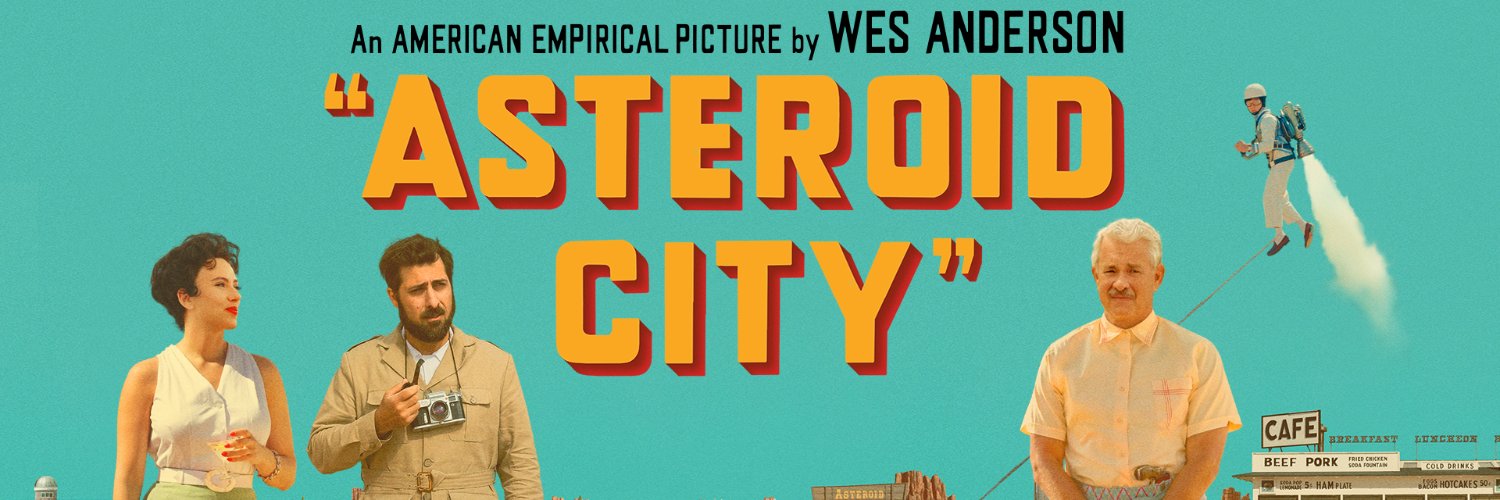
Film Writer Tom Stone reviews Asteroid City, finding it to be a satisfying synthesis of Anderson’s fimography
Wes Anderson has a busy year with yet another Netflix Roald Dahl adaptation, but before that is an original: Asteroid City. A film that is still firmly within his wheelhouse of engaging and exciting stories about eccentric characters, depicted through his unique and endlessly satisfying combination of immersive cinematography and delightful soundtracks.
Asteroid City will be very familiar to fans of Anderson’s work up to a point. Its primary narrative follows Augie Steenbeck (Jason Schwarzmann) travelling with his children to Asteroid City for a science convention that becomes witness to unexpected extra-terrestrial events. From here the story follows what you might expect. There are many interesting and unusual characters to learn about, with another all-star cast. Including: Scarlet Johanson’s suicidal actress; Tom Hanks as a stoic grandfather; Jeffrey Wright’s military general; Tilda Swinton’s awkward astrophysicist; all under Bryan Cranston’s soothing narration.
The aesthetic is just as Anderson-esque as ever, with his neat, precise framing and orderly delivery of information visually and narratively
Accompanying the expected eccentric characters are comedic moments incorporating excellent timing, dry-as-the-desert delivery, and a rhythmic pace supported by the repetitive soundtrack motif. The aesthetic is just as Anderson-esque as ever, with his neat, precise framing and orderly delivery of information visually and narratively; it is a perfect synthesis of his style that he seems more comfortable at deploying. Think Grand Budapest Hotel or Fantastic Mr Fox, with the creative boundary-pushing edge of The French Dispatch.
Where disparate views on the overall film arise however is in its connection with a secondary story that holds a rather tricky metaphysical relation to Asteroid City proper. In conjunction with the town of the eponymous title, is a play also entitled ‘Asteroid City’ through which Bryan Cranston’s narration connects the film-reality with the play-reality. It is as though the colourful world of the city itself is a projection of the black and white play. Confusion may certainly arise here in how it is not clear in the first place why there are two stories running in tandem, especially where the black and white behind the scenes moments sometimes take on a play-like quality in and of themselves – akin to moments in The French Dispatch creatively speaking. These moments are also a little more serious or ambiguous, quite in contrast to the bright and vibrant humour of the film-reality. Again, it is almost like running the more complex aspects of the French Dispatch alongside one of his more upbeat and easily digestible films.
Unlike the French Dispatch however, Asteroid City maintains Anderson’s modus operandi in the primary story but becomes harder to grasp as it overlaps with its black and white alternate world and indulges in fourth wall breaks and existentially-abstract scenes. It is for these reasons that you should not go in expecting a normal Anderson flick. It is certainly helpful to view this in a similar way to Charlie Kaufman’s work (I am Thinking of Ending Things or Synecdoche New York) in how the story and characters themselves rise above any notion of reality present in the story, where it is the themes at play that matter more than the logistics of events.
It is a perfect synthesis of his style that he seems more comfortable at deploying
It is totally understandable why many people will leave this film disappointed, and likely confused, but I do not think this is a bad mark against the film overall. It is certainly valid to critique the delivery of the messaging in its clarity, as I did not really appreciate what the film was trying to do until a little after the credits had rolled, but it was certainly rewarding to think through. Plus, if Anderson had pushed further into the sci-fi narrative over the play, it would only have obscured his deeper message; it strikes a delicate balance such to encourage a deeper analysis from the viewer.
Verdict:
This is personal preference of course, but there is something far more transcendental about a story that allows the division of storytelling mediums to crumble, that encourages you to let fall the concept of a genuine reality in any piece of media. There is no play, and there is no film, there is no Asteroid City: simply the human struggle for meaning – and an alien.
Rating: 4/5
Enjoyed this review? Check out these other recent articles from Redbrick Film:
Review: Oppenheimer | Redbrick Film
The Influence of the Nuclear Bomb on Japanese Cinema | Redbrick Film
Comments